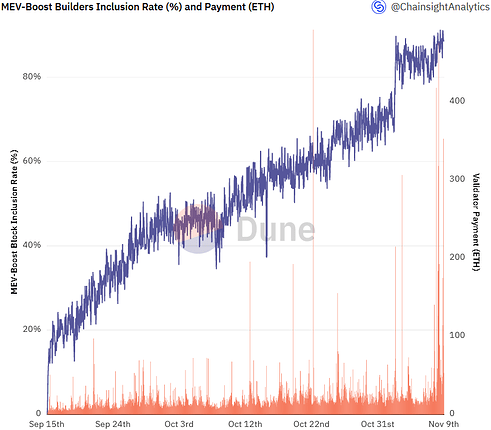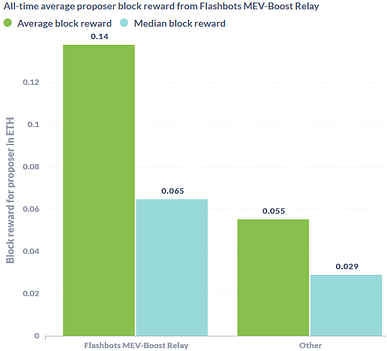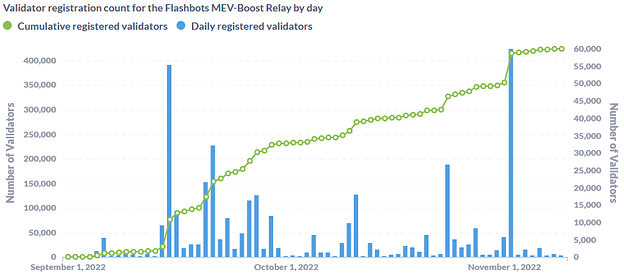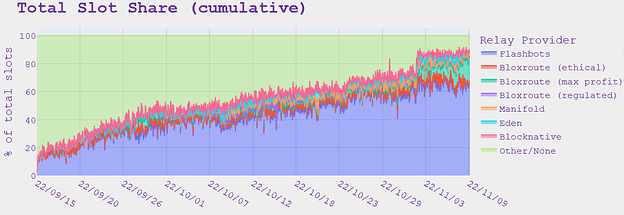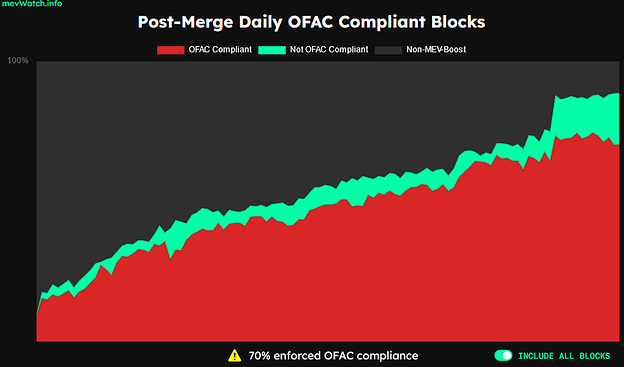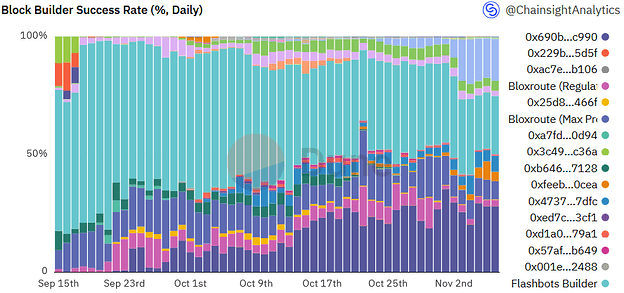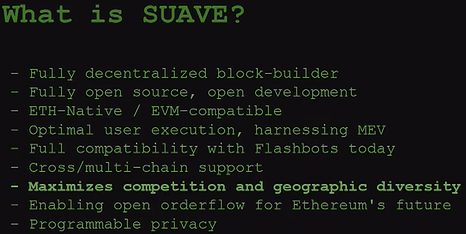Overview
Welcome back to this second edition in “Season 2” of the Flashbots Transparency Reports.
These reports aim to cover the recent developments, research, discussions and events related to Flashbots. This edition will focus on the adoption of MEV-Boost, highlights from Devcon VI and the introduction of SUAVE.
MEV-Boost
It’s been 8 weeks since the Merge and the adoption of MEV-Boost continues at a remarkable rate. As of publishing this report 88% of Ethereum blocks in the last 24 hours were relayed through MEV-Boost, earning these validators on average almost 300% more in block rewards.
From the MEV-Boost Dashboard by ChainsightAnalytics
The volatility of proposer payments continues to be high with some exceptional outliers. However, even when comparing the median block rewards, MEV-Boost blocks consistently outperform locally built blocks by over 100%.
From the Flashbots Transparency dashboard
On November 1st, Coinbase Cloud announced that MEV-Boost would be available as an opt-in MEV solution for their ETH staking customers. The following day, the Flashbots Relay hit a new ATH for the highest number of validators registered in a given day, beating out the day of the Merge by a few hundred registrations. Over 55,000 new validators registered on November 2nd which is over 10% of the total validator set on Ethereum!
From the Flashbots Transparency dashboard
In under 2 months MEV-Boost has reached almost 90% adoption by block proposers, a process that took mev-geth over a year to achieve. Democratizing access to MEV by allowing solo validators to participate on equal footing as sophisticated staking providers is essential to ensure a decentralized validator set on Ethereum.
Relays
A new relay began its operation in October, bringing the number of active relayers up to 8. Relayooor, maintained by builder0x69, is the first non-Flashbots relay that’s permissionless, allowing any builder to submit bids.
The Flashbots Relay continues to dominate with 85% of all validators having added the relay to their MEV-Boost configuration. A month ago, the Flashbots Relay had proposed 84% of all MEV-Boost blocks since the Merge, today that number is at 80%. This looks to be the start of a trend in relay diversification and we encourage more permissionless relayers to come online and attract adoption from both builders and validators!
From mevboost.pics
70% of all new blocks proposed on Ethereum are currently sourced from relayers that do not include transactions interacting with OFAC sanctioned addresses. Post-merge less than 1% of blocks have contained one, or more, of these transactions. These blacklisted transactions will on average now need to wait 2 additional blocks before being included.
From mevwatch.info
This censorship does not occur on the consensus layer, as relaying blocks is performed off-protocol, but it’s still concerning and needs to be addressed. The adoption of MEV-Boost outpaced our effort in building the competitive ecosystems we’re striving towards and we need to find ways to combat this growing issue. Below is a list of conversations surfacing different areas on the topic and some potential solutions to diversify the relay market and increase the capability of validators:
- Utilize inclusion lists or partial block auctions to constrain the power of block builders, for example through MEV-Boost + Eigenlayer.
- Structure a standard for block scoring to optimize proposer profit switching between relays.
- Ideas for incentivizing relays without them needing to vertically integrate a builder.
- Understand what makes a relay trust-worthy to help bootstrap adoption of new actors.
- Other creative ways on how relayers may forfeit sending their most valuable payload if the content is deemed to be censored.
- [insert your own thread here!]
The Flashbots Relay
A series of updates has been made to the Flashbots Relay during the last month:
v0.11.0
This release introduced block builder submission cancellations. Previously only a higher value payload could override the previous one. With this change, the latest payload sent by the builder will always be used.
For any given slot, the Flashbots relay receives about 450 payloads from 30 different builders, the block submission rate limit is now set to 2 submissions / second / IP address.
The v0.11.0 release also added two often requested fields to the Data API that will allow for a greater variety of community explorations and visualizations:
block_number-
num_tx(number of transactions in the payload)
For more details on the full feature list, see the announcement post.
- Fix the memory leaks when using db.PrepareNamed
- Remove limit when querying for slot of block_number
- Update to Go 1.19
Bundle cancellations
Bundle cancellation and replacement are being tested on our mainnet staging env via the new optional userUuid-field. The bundle is considered canceled once either the eth_sendBundle or eth_cancelBundle returns 200.
Full bulk data
You can now access the data on all delivered payloads and builder block submissions so far from the Flashbots Relay in both CSV and JSON format. The data includes 150k payloads and 36M builder block submissions(!)
Data-API
The previous limit of 200-entries when querying the Flashbots Relay Data API for builder submissions for a specific slot or block_number has been removed. If you’ve previously saved/indexed all bids, you may have incomplete information and should reindex (starting with the full bulk data download mentioned above).
Builders
Block building has become increasingly competitive in this second month after the Merge. There is a growing diversity in the builder market, both in terms of the number of unique builders and in terms of their market share. The Flashbots builders have landed the most blocks since the Merge, however @builder0x69 is currently leading in terms of the number of bids won per day. Builder0x69 is currently winning 27% of new MEV-Boost blocks, compared to Flashbots 25%.
From the MEV-Boost Dashboard by ChainsightAnalytics
The builder role will, in contrast to relayers, continue to exist with in-protocol PBS and it’s important that we continue to research potential ways to decentralize the market of block building. Flashbots is devoted to fight all forms of centralization as a result of the negative externalities of MEV and we are committed to building systems that avoid entrenching actors at every step and strengthen the base layer neutrality of Ethereum.
MEV-Boost Development
MEV-Boost v1.4.0 has been released! This update includes a number of improvements, for example;
- The ability to set a minimum bid value using the new
-min-bidflag. Below this value, MEV-Boost won’t provide a bid to the beacon node and the CL client will propose a locally built block. - Sending the signed builder bid and signed blinded beacon block to the relay monitor to verify the integrity of the auction.
- Make it easier to configure multiple relays
- Use
-mainnetby default - Always log the MEV-Boost version to simplify debugging
- Update to Go 1.19
@metachris shared additional ideas for the next milestones of MEV-Boost:
-
Standardized block-scoring
2. Merkle-proof of payment as part of the bids
3. Beacon nodes profit switching with local payload - SSZ encoded payloads (instead of JSON only)
- Inclusion lists and partial block auction
The systemic importance of MEV-Boost on Ethereum makes it necessary to be thoughtful about how ongoing research and development should be organized. Help us navigate this path towards an open, collaborative, and effective R&D process for MEV-Boost by joining the conversation:
For additional information on what’s happening in and around MEV-Boost, see: MEV-Boost Status Update - 2022-11-03.
Other Development Updates
We’ve open sourced Sync Proxy – A lightweight proxy between beacon nodes and EL-clients which enables a group of beacon nodes to drive a group of EL-clients in a redundant and performant way. By using a group of beacon nodes instead of one, issues from any single beacon node is mitigated and the need for adding a beacon node to every execution-layer client is removed.
SUAVE
During the Devcon presentation by @phil, MEV for the Next Billion: It’s Time to Get Serious, the next generation of Flashbots codenamed SUAVE (Single Unifying Auction for Value Expression) was introduced. SUAVE has been in development for a year and we’re excited to start releasing and building it out iteratively together with the community.
SUAVE is the start of a new cooperative phase of MEV which aims to decentralize the monolithic builder role and combat the centralizing forces of exclusive order flows. It is an Ethereum native, mev-aware and privacy-first encrypted mempool which protects against the entrenchment of any actor and eliminates any central points of control, including Flashbots.
Keep an eye on the forum as more information on SUAVE will be published and join us in building this decentralized future together!
Research and discussions
Questions around mempool privacy using threshold encryption by @ra raise questions regarding the concept of preventing MEV through mempool privacy using threshold encryption. The post highlights unknowns related to validator collusion, spam prevention, arbitrage opportunities and more.
The dream of redistributing the extracted value by @guayabyte invites to a conversation on the possibilities of MEV redistribution. Redistribution of MEV is one of the goals Flashbots set out to achieve two years ago. Our first two goals, illuminate and democratize, have so far taken priority and it’s now time we collectively start building systems to distribute the benefits of MEV back to the community. The post explores redistribution across five dimensions:
- Universal Basic Income
- Rewards to individuals proportional to the value they create
- Funding for public goods
- Awareness for 7 generations into the future
- Mourning, healing, and space for all the non-human critters being affected in the process.
To burn or not? by @Hasu is a response to a post published by domothy titled Burning MEV through block proposer auctions. The original post introduce the idea of a committee of proposers competing for upcoming slots where the winner is determined by whoever is willing to burn the most ETH. The goals of the mechanism would be to smooth validator rewards and distribute MEV to ETH holders.
The reply by Hasu argues that the economic security of Ethereum is derived from validator payments. By burning the rewards a tragedy of the commons game would be introduced which would lead to an erosion of economic security as well as validator centralization.
Privacy Concerns with Data API by @jtraglia starts a conversation on preserving privacy of the MEV-Boost Relay Data API for checking/verifying validator registrations. A particular point brought up is the possibility to analyze relay registrations and group validators together based on their timestamp. Another question raised is if the API should return all registered validators, or only those that are currently active.
Flashbots research has recently accepted four new Flashbots Research Proposal (FRPs):
- FRP-21: MEV in fixed gas price blockchains
- FRP-22: Quantifying the Impact of Frontrunning and Randomness on UX
- FRP-23: Welfare, AMMs and MEV
- FRP-24: On the quantification of MEV on L2s
Anyone can submit a research proposal for consideration and might become eligible for a grant!
Public appearances and events
October was a busy month in terms of public appearances with talks & panels at Devcon and workshops & roundtables during our MEV-Workshop. Listed below are information regarding the public appearances by Flashbots mates since the last report. The next chapter below provides additional content related to Flashbots, MEV and PBS from the broader community.
Devcon
- This is not MEV by @fiiiu talks about the difficulties with arriving at a formalization of MEV, and surveys some proposals.
- This is MEV by @sxysun introduce 3EV, or {Mafia, Moloch, Monarch} Extractable Value as a way to define and categorize MEV.
- Evaluating the PBS Experiment: Early insights from MEV-Boost and the Builder Market by @jolene cover what we have learned from the rollout of MEV-Boost, the emerging builder market, and what this means for the future of in-protocol PBS.
- MEV for the Next Billions: It’s Time to Get Serious by @phil walked through the past, present, and the future of Flashbots.
- Panel - MEV on L2 with @alex, Tarun Chitra, Guillermo Angeris and Jannik Luhn discuss censorship resistance, credible neutrality and more.
- Panel - A Discussion on Credibly Neutral Systems with @phil, Patrick McCorry, Sebastian Buergel, Martin Köppelmann and Sreeram Kannan dove deep into what credible neutrality constitutes, whether it needs defending, and how we should go about it.
- Panel - Deep Dive on DeSoc with @puja and @vbuterin talked about SBTs, decentralized social networks and identity.
- Workshop - Bottom Up Building - Pathways towards a Decentralized Society with Paula Berman, @puja & Glen Weyl discussed enhanced social coordination, decentralization and ways to foster consensus across differences.
- The Block Research: MEV, Flashbots, Decentralization with @hasu talked through the current state of Flashbots with a focus on MEV-Boost, PBS and the externalities of MEV.
MEV Workshop
Flashbots hosted MEV Workshop during Devcon on October 14th as a one-day event with discussions related to searching, data, research, and product. Below is a summary of each track with links to notes and material for further reading.
Searching from Scratch
The day started out with a workshop for searchers hosted by @bhaki and @brock. Bhaki started off with a walk through of how transaction- and bundle flow works post-merge as well as an overview of MEV-Boost and what’s next on the horizon.
Brock then live-coded a backrunner performing arbitrage based on Uniswap trades with input from the audience (Backrun blueprint, Backrunner code).
MEV-Workshop Data Exploration
The data exploration workshop, hosted by @elainehu and Jonathan Levi, provided attendees with a dataset from the initial month of block building from the Flashbots MEV-Boost Relay. The workshop presented methods to discover interesting facts and trends in MEV for block builders, proposers and validators and discussed open questions arising from the MEV models post-merge. (material)
PBS Developers Roundtable
The developer focused roundtable hosted by @kailin @guayabyte invited Ethereum ecosystem partners and contributors to align on the future of MEV-Boost, ways of combating block builder centralization, inclusion lists and decentralizing PBS.
PBS Researchers Roundtable
The research discussions, hosted by @sarah.allen, @barnabemonnot, @sxysun and @alex, brought together PBS researchers to discuss:
Session 1: PBS Seen from the Protocol
Session 2: Builder Innovation and MEV Mechanism Expressivity
Session 3: Private Block Building
![]() In order to stay up to date on any upcoming events feel free to subscribe to the Flashbots Collective calendar!
In order to stay up to date on any upcoming events feel free to subscribe to the Flashbots Collective calendar!
Resources
Below is a collection of talks, publications, dashboards and other content from the broader community in the last month related to Flashbots, MEV and PBS. Feel free to check out the list from the last report for even more amazing resources!
Devcon
- Block Building After the Merge by @ralexstokes investigates block building and what considerations the move to PoS brings to the process.
- Updates on Proposer-Builder Separation by Barnabé Monnot discuss updates on PBS and economic models for validators, builders, searchers and users.
- Future-block MEV in Proof of Stake by Torgin Mackinga touches on new types of MEV and attacks derived from proposers being known ahead of time in PoS Ethereum.
- Hybrid PBS from CL’s perspective by Terence Tsao addresses questions regarding PBS from the consensus layers point of view and what the remaining open questions are before full PBS.
- Cost of Feudalism: Towards a Theory of MEV by Guillermo Angeris and Tarun Chitra explores the theoretical foundation of MEV, how MEV might be quantified and potential ways we can harness MEV for good.
- One Block, One Batch: Examining the Potential of Frequent Batch Auctions in Ethereum by Anna George examines how frequent batch auctions can bring fairness to decentralized trading and protect Ethereum’s various stakeholders.
Articles, papers and posts
- Using Topological Data Analysis to Identify Distinct MEV Behavior by @0xEvan shares some results from an upcoming paper on how MEV bots perform dex-to-dex arbitrage in reactions to market events.
- Notes on Proposer-Builder Separation (PBS) by Barnabé Monnot is a collection of the various topics related to PBS and how they all tie in together.
- The Secretive World Of MEV, Where Bots Front-Run Crypto Investors For Big Profits by Jeff Kauflin in Forbes interviews MEV engineer Nathan Worsley on MEV and the competitive landscape of searching.
- Since the Merge: How Are Things Changing? by @pintail takes a look at the distribution of rewards earned by validators 6 weeks post-merge and compares results to their previous post published before the Merge.
- Practical Guide into Analyzing MEV in the Proof-of-Stake Era by Toni Wahrstätter provides a guide to analyzing MEV, MEV-Boost data, and the effects of the PoS-switch on MEV.
- Preserving Block Proposer Agency with MEV-Boost using EigenLayer by Sreeram Kannan presents an architecture for achieving partial-block building with MEV-Boost via EigenLayer.
- OF Auctions for Oracles (OEV) by @doge_bull presents an auction solution specifically designed with oracle related MEV in mind.
- Law and regulation vs MEV extraction by @MikolajBarczentewicz gives a general overview of potential legal and regulatory problems for MEV extraction.
- We’re going to estimate a lower bound of cross-domain MEV by @sam from Odos.xyz presents their Cross-domain Arbitrage Tracker that measures cross-domain arbitrage on Uniswap v2 pools across several different chains.
- PBS: Neutralizing the Dark Forest by Pseudotheos and Domothy summarize where PBS-research is so far- and where it’s headed.
- MEV-boost and layer-1’s censorship resistance by Patrick McCorry describes MEV-boost, OFAC-enforcing Relays and how the fee market does not protect transaction inclusion.
- Marius van der Wijden describes why local block building on the previous version of geth worse than it could be and how the new release drastically increases rewards.
- Exploring the impact of MEV relays by Attestant looks at the block building process and analyzes block times before and after the Merge, and the impact of relayers.
- First 10,000 blocks and new features by builder0x69 celebrates their first 10,000 slots won, clarifies their stance and announces new features.
- Is the Block Building market doomed to monopoly? by SajZ takes a look at the current diversity in the relay and block builder markets.
- Validators or value-takers? by Migalabs and Metrika deep dives into the Merge and MEV-Boost and the impact it has on EL, CL and decentralization of Ethereum.
- The Merge series: Performance is the first part of a series that looks at validator performance around The Merge.
- Lido on Ethereum: Relay Voting Proposal outlining a list of “must-include” and “allow” relays for the LidoDAO to discuss and vote on.
- Alexander Nezlobin posted a thread on “lazy” multiblock MEV and how it may incentivize centralization of block proposers.
- Blocknative analyzed all MEV-Boost blocks and found that the current average percentage of private transactions are 3.8%, and growing.
Dashboards
- EigenPhi MEV Dashboard provides live insights into MEV data with the ability to inspect contracts and transactions.
- Tornado Warnings by Toni Wahrstätter shows stats for the existing MEV-Boost Relays and the MEV-boosted blocks of the last day that contained Tornado Cash transactions.
- Where did the orderflow go? by @danning.sui looks at block production before and after the Merge as well as order flow from Cowswap and Metamask.
- Inclusion Watch by Donnoh and Emiliano provides inclusion and waiting time probability for blacklisted transactions to be included in a block.
Other
- Epicenter - Ep467 Ethereum – State of Affairs After the Merge featuring @vbuterin discusses censorship, PBS, MEV and Flashbots.
- @mevproposerbot by Toni Wahrstätter and @MevBoostBot by Alberto Cevallos tweets information of MEV-Boost blocks with large payments to the proposer.
- PBS - Key Research & References by @metachris is a list of key material regarding PBS on Ethereum.
- Swagger docs for the Relay Data API are being developed by Justin Traglia.
Get involved
At Flashbots, we research and build systems around MEV, and we would love to collaborate with you. We are a distributed organization with the principles of a pirate hacker collective, and have several open positions.We also issue grants to external researchers doing work aligned with ours, please find out more in our Research repository.
Make sure to also take a look around here on our forum and join the conversation!
Previous Transparency reports
Feedback on Transparency Report structure & content
